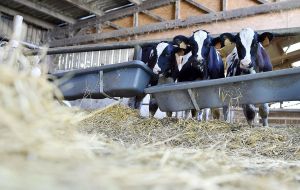MercoPress. South Atlantic News Agency
British/Argentina AMR research partnership programs with £5 million of UK aid
 “The research program represents the best of British and Argentine technical abilities, and will have an international impact” said UK ambassador Mark Kent
“The research program represents the best of British and Argentine technical abilities, and will have an international impact” said UK ambassador Mark Kent  Tackling antimicrobial resistance is a global priority, and investigating AMR in agriculture and the environment is crucial.
Tackling antimicrobial resistance is a global priority, and investigating AMR in agriculture and the environment is crucial. The UK government has provided £5 million of aid as part of an Argentine program to manage antimicrobial resistance (AMR) in agriculture and its impact on the environment. The funding will go to five research partnerships between the UK and Argentina.
The UK government has provided £5 million of aid as part of an Argentine program to manage antimicrobial resistance (AMR) in agriculture and its impact on the environment. The funding will go to five research partnerships between the UK and Argentina.
It has been awarded through the Global AMR Innovation Fund (GAMRIF) and will be matched in staff and lab resources by the National Scientific and Technical Research Council (CONICET) in Argentina.
British and Argentine researchers are launching the ‘Tools to tackle AMR in the environment’ program in Buenos Aires this week. The partnerships receiving the award are:
William Gaze (University of Exeter) and Alejandro Petroni (Administración Nacional de Laboratorios e Institutos de Salud “Dr Carlos G Malbrán”) to develop a conceptual framework to improve understanding of AMR in livestock systems for translation into policy and practice.
Helen West (University of Nottingham) and Sonia Gómez (Administración Nacional de Laboratorios e Institutos de Salud “Dr Carlos G Malbrán”) to develop best practice for waste management in commercial chicken farms in Argentina to manage AMR
Dominic Moran (University of Edinburgh) and Mariano Fernandez Miykawa (Instituto Nacional de Tecnología Agropecuaria) to understand and quantify the environmental impacts of antimicrobial use in chickens supply chains and design interventions that are cost effective for producers.
Peers Davies (University of Liverpool) and Sergio Sanchez-Bruni (Centro de Investigación Veterinaria de Tandil) to develop an antimicrobial surveillance framework for the Argentine beef industry to understand how antimicrobial usage and farming practices impact for environment
Kirsten Reyher (University of Bristol) and Rodolfo Luzbel de la Sota (Universidad Nacional de La Plata) to investigate the prevalence and causes of AMR in Argentine farming systems and the impact on the near farm environment.
The research will benefit low and middle-income countries, which are disproportionately impacted by AMR.
The program will be delivered on behalf of GAMRIF by the Biotechnology and Biological Sciences Research Council (BBSRC) and the Natural Environment Research Council (NERC) in the UK and by CONICET in Argentina.
The use of antimicrobial drugs in livestock production is a primary contributor to the development and spread of AMR. Drug-resistant microbes can be transmitted from animals to humans via direct contact or through the food chain and the environment, which poses a potential significant threat to human health.
Mark Kent, UK Ambassador to Argentina said: “Today’s announcement is further evidence that the UK is committed to working with Argentina to help tackle global issues. Antimicrobial resistance is a threat which is killing hundreds of thousands of people across the world each year.
”The research program represents the best of British and Argentine technical abilities, and will have an international impact. Tackling antimicrobial resistance is a global priority, and investigating AMR in agriculture and the environment is crucial.
“This partnership is exciting, not only because it is good for UK and Argentine science, but because the benefits could be shared with developing and emerging economies around the world”.
The Director of Scientific Development at CONICET, Dr. Jorge Tezon said: “High-quality research is needed to increase our ability to effectively treat bacterial infections in humans and animals. That’s why CONICET has decided to partner with DHSC, BBSRC and NERC and promote joint research projects.
”At the national level, Argentina promotes interdisciplinary work with different actors focused on the concept of ‘one health’. This research programme is particularly important as it involves interaction between national stakeholders on AMR.
“We also expect that this could benefit other countries and regions around the world which are disproportionately affected by AMR and help them improve food security and the associated economics”.




Top Comments
Disclaimer & comment rules-

-

-

Read all commentsSee how generous the UK is. The foreign aid that is given to the world would keep all the homeless and down and outs on the streets of London off the streets and live happily ever after.
Oct 03rd, 2019 - 01:51 pm 0So you'd rather the money was used to give handouts to down-and-outs so they can sit on their arses and watch the world go by? ;)
Oct 04th, 2019 - 09:18 am 0Sooner they received it rather than the dictators pocketing it.A son of an African dictator had a £ 5 million pound home in London and 5 top of the range sports cars Lamborgini, Ferrari, Maserati etc
Oct 04th, 2019 - 12:37 pm 0Commenting for this story is now closed.
If you have a Facebook account, become a fan and comment on our Facebook Page!